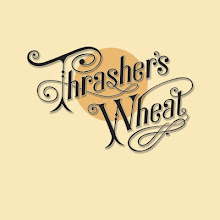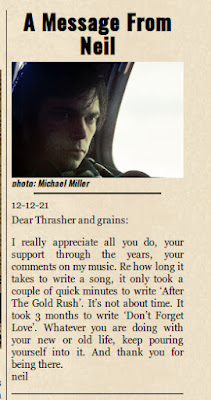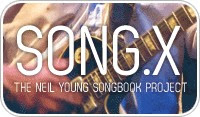Comment of the Moment: Fans Pre-Judgement of Americana Continues

(Zoom Album Cover)
Only within the past few days when UNCUT Magazine published "First Listen" , has anyone actually listened to "Americana" and been able to comment based on more than hearsay, rumor, innuendo, and/or album cover, liner notes and lyrics.
Yet -- a surprising (or maybe not) volume of fan commentary on the upcoming album Americana by Neil Young & Crazy Horse -- even though no one had even heard a single note.
So, naturally, our Comment of the Moment concerns preconceptions on Americana by Neil Young & Crazy Horse by Matt L.:
Is it really Neil's, or any artist's "responsibility" to either the song, history or the music fan, to adhere to or at least reference or explain the original purpose of a piece of music, and the political, social or spiritual climate of its time, in some way, so that the authenticity and history of something isn't lost or disrespected?
Does he owe it to the song, the song's author or the music fan to prostrate himself before the energy that created that piece of music and deliver it into the 21st century in a way that retains, and even helps to convey or preserve a clear idea of the song and its history? Or, more importantly, to not undermine reality or contribute to confusing, or even rewriting, history?
This is definitely a very important topic, and I feel strongly about retaining the purity of historical accounting, but I would argue "no" to the question of Neil's responsibility as an artist toward either some kind of historical or social accuracy, or toward supporting a certain political identification, or simply toward NOT doing something that could be perceived as insulting to those of us with touchy emotional triggers about American Indians, the dark history of Colonial America, or the authenticity of music history.
Why?
Because that is the job of historians. It is the job of artists to paint the sky with beauty, not to write history books.
They are free to be as accurate as they wish, should they desire to do so, or feel a sense of personal responsibility, but they should not be required to do so.
Neil has already explored American History many times in his songs, and has as much (ore moreso) converted it into dreams that reflect his own inner reality as address the significance of the topic's outer significance.
Take Pocahontas, my favorite Neil Young song. A deeply touching, overflowing statement about reducing the living, flowing passions of a thriving culture into a dusty historical relic admired by the very people who destroyed that culture.
It's so beautiful, haunting, thoughtful, everything that makes a passionate song something to revere. But is it a historical document, or a voyage through the soul of Neil Young himself, and his own internal contradictions, feelings of loss and yearning, a sort of poetic emoting from the past that he's channeling through the paint brush of his own inner being, that emerges in a wholly unique form from being filtered through him?
Or Peaceful Valley Boulevard. A very similar lament to Pocahontas, but much broader in context, that explores the relationships between scenes of early American settlers, this time being attacked and massacred by Indians, and how the brutality of ignorance, selfishness and fear have translated from one time period to another. From the peaceful valley to Peaceful Valley Boulevard, again crass American materialism sucking the life out of something beautiful and natural and turning it into something lifeless, meaningless and culturally or spiritually dead.
But are either of these songs really "accurate" in some important historical sense? Certainly they make references to terrible things that happened, in a general way, in the history of early America, and convey very poignantly the sense of hopelessness as industry and materialism annihilate the beauty of the world, which is all very important and meaningful...
...but are not both of these songs simply avenues for Neil to explore the confused and intense feelings inside himself, and in essence capture and discuss the commonality of these feelings in a more universal way that speaks to the human condition itself?
In the end, does it have to be pedantically accurate, or contain a specific accounting of history that is responsible in the way a history book should be (should be) responsible, or should it be a free-flowing statement of art that cries out from the soul of humanity, and is evocative, and causes people to feel and explore their own intense emotions and internalized confusion about life??
No, and yes. Neil has played around with history before, and used it in a way that furthers the latter process.
So why does altering a photograph constitute some kind of slap-in-the-face to history when it is not a historical accounting, but an artistic statement?
Why is accurately and clearly explaining a song's origination necessary?
None of the inaccuracies or alterations that Neil either willfully chooses to do, or simply accidentally does out of his own ignorance, are important to the artistic explorations themselves.
Altering things is as much a part of art as anything else, and in fact, throughout history, art has served as a vehicle for re-imagining things. And while the artist has every right to be as accurate as he or she wants, the very nature of artistic license makes it unnecessary to do so.
It's just not the purpose or responsibility of art, and in fact, if we perceived art to have that kind of responsibility, it would serve only to undermine the very free-flowing expressions and nature of art itself.
That said, is it really necessary for an artist like Neil to cater to everyone’s sensitivities? Altering a historical photograph is an artistic statement, not a historical statement. Is it necessary for an artist to say, “This is Americana and that is not Americana” in some sort of agreed-upon way because of some kind of universal social agreement that we have? Neil is not a historian. If he says God Save the Queen and Gallows Pole are going to appear on his “Americana” album, then well, dammit, that’s what he’s gonna do. It doesn’t invalidate the record, the music, or anything he’s doing. At all.
And as far as bigotry goes, I think we can all pretty much see the reality that Oh Susanna is always going to exist. It is a part of the lexicon of music from which America was born. I’m not sure whether Neil has altered the lyrics or something, or simply left in the racist overtones, or what. But it’s his right. Neil does not have to answer to anyone else’s sensitivities, and that’s not only his right as an artist, but it’s absolutely necessary. If Neil gave in to everyone’s sensitivities throughout his career, would half of his music even exist, and would the other half be nearly as good?
Getting offended at Neil Young is a laughable, ridiculous thing to do.
Any Neil Young fan should know by now that Neil’s art, as well as his ACTIONS, ARE sometimes offensive to peoples’ sensibilities, but that they are obviously necessary in order for his art to retain its biting, courageous spirit and authenticity.
Thank you Matt! Well put. Appreciate yours -- and everyone's else's -- opinion of Americana.
As for us? We can't wait to actually hear for ourselves, naturally. We'll try and not let our "pre-judgement biases" of Americana get the best of us. So we're confident that we can maintain that profile for the next 2 months... or not. ;)































 Human Highway
Human Highway

















 Concert Review of the Moment
Concert Review of the Moment





 This Land is My Land
This Land is My Land

 FREEDOM In A New Year
FREEDOM In A New Year









 *Thanks Neil!*
*Thanks Neil!*




![[EFC Blue Ribbon - Free Speech Online]](http://www.thrasherswheat.org/gifs/free-speech.gif)











 The Unbearable Lightness of Being Neil Young
The Unbearable Lightness of Being Neil Young Pardon My Heart
Pardon My Heart



 "We're The Ones
"We're The Ones  Thanks for Supporting Thrasher's Wheat!
Thanks for Supporting Thrasher's Wheat!




 This blog
This blog 
 (... he didn't kill himself either...)
#AaronDidntKillHimself
(... he didn't kill himself either...)
#AaronDidntKillHimself









































































 Neil Young's Moon Songs
Neil Young's Moon Songs




 Civic Duty Is Not Terrorism
Civic Duty Is Not Terrorism Orwell (and Grandpa) Was Right
Orwell (and Grandpa) Was Right


 What's So Funny About
What's So Funny About 



11 Comments:
Thanks Thrash!
I do have a criticism, though. I don't like the font they used for the album title. It looks like a bad photoshop font.
But I have no problem with them using it, and am perfectly happy to let it slide.
I really would have liked to see the word written in big, flowing, artsy script or something, though.
Oh well, I guess I can't have it all! lol
No one is making a judgement call about the "quality" of the music or the design. No one is questioning whether the sound or delivery of the song will be good, either. Tom could have used a burlap bag with "Americana" stamped on it and people would have bought it just the same because it has Neil & Crazy Horse's name on it.
I am glad that no one took personal offense to what I wrote about the concept & artist's responsibility to be true to the history of the Americana folk songs in the liner notes and cover art.
I did appreciate Thos., Matt, and Greg's very throughtful observations about the subject matter.
Historians today actually look to artists of that particular time in history in question who provided a different perspective or view that didn't make it into the newspapers or into earlier history books.
Artists are historians in many ways, Matt. Some even made incredible contributions to scientific research without even knowing it.
Neil has this keen 6th sense and sensitivity about people and history. It shows in the songs he writes. I was just surprised by the treatment he gave the liner notes and cover art.
I never said he was a racist or bigot. Yes, some of the songs he brings into his repertoire were written specifically to appease a popular American culture feeding on a rich diet racism and bigotry and he missed his opportunity as an artist to tell his listeners so. That's water over the bridge anyway. No women, children, or animals were hurt during the production.
Life is good. Rock on.
"Comment of the Moment", I hardly think so, how about "Most awesome Comment ever posted on Thrasher's Wheat"!! Right on Matt!!
This comment has been removed by the author.
If I tried a million times, I couldn’t have come up with what you wrote, Matt. I mean, give me a break, where do you “come up with this stuff?”: “… a voyage through the soul of Neil Young himself, and his own internal contradictions, feelings of loss and yearning, a sort of poetic emoting from the past that he's channeling through the paint brush of his own inner being, that emerges in a wholly unique form from being filtered through him?” As always, I love your passion. In retrospect, all of this could probably be simply reduced to another idea you mentioned- artistic license, and of course the ultimate chestnut, “Getting offended at Neil Young is a laughable, ridiculous thing to do.” Let me just repeat some of my response to what you wrote from the original thread.
“I personally am not making any demand in terms of ideology. I think Neil’s iconoclastic sensibilities are fairly well known, and in no danger of misinterpretation.
Where I disagree is that with the inclusion of liner notes, as well as the production of an entire concept album surrounding a body of folk tradition, or “Americana”, Neil takes momentary leave from a purely artistic effort, and enters into the purview of historian. But this is not something I would ever want to use to beat him over the head with, it’s just as I said, it would be both wise and fair to include a few lines drawing a distinction, where present, between the songs original meaning, and what it has come to mean in the retelling.
But quibbles aside, we’re talking about Neil here, and what I think he should or shouldn’t do in terms of justifying his artistic viewpoint is so much hot air. History is only peripheral to the music with Neil, and that is as it should be.
…I side with Matt when he says “Personally, I'm well aware of the bigotry and racism that has permeated our culture, and continues to do so.” I think most people are aware, Neil included, so I don’t think that every historical allusion needs to be accompanied by a defining statement reiterating the self evident truth of America’s exploitative past, both in its official capacity, as well as the cultural and personal character of its people. Still, what would it hurt to expand the liner notes to give the songs a more complete historical basis?
Great stuff, but I can’t wait to (he said with tongue planted firmly in cheek) actually hear the album…”
A Friend Of Yours
Well, well, Thrasher. Now that archives guy or someone else from Neil's camp - maybe even bored hiding-out Neil himself- is obviously posting anonymously to your site, it gives a new perspective to attacks that you and Neil and your readers have launched against anonymous posting. Hypocrisy much?
Why would there be any reason for concern from archives guy or even a bored hiding-out Neil. Why do you think they need to take ownership of my feelings?
It's pretty clear I'm the odd person out here. Being in the minority all the time sucks but hey, that's life.
Kudos to Neil. Somehow in releasing an albums of songs, many of which I think may have been on a silly record called Kindergarten Hootenany I listened to at age 4 in about 1963, he has created a dustup among his own fans.
Part of the OVER-politicization of everything nowadays. It's a new Neil Young record. Listen. Like or don't. Move on. Grow up. I am sure he doesn't mean for Oh Susannah to be a an attack on blacks.
Folk songs grow and change and adapt over the years. They get used for different purposes with different lyrics. Neil I am sure did not fall in for Oh Susannah in it's darkest, foul, "darkie" version.
Raincheck,
Yes everything appears to be politicized but that's not the point. The point is that NEIL IS THE ONE BEING POLITICALLY CORRECT by whitewashing an important aspect of an Americana folk song that BECAME POPULAR because it dehumanized blacks. It's who we use to be as a country like it or not. It's part of our collective experience as Americans. Do we take responsibility for this history by acknowledging it? Sharing it? Singing it? Or do we wash it away by ignoring the folk history?
By ignoring the folk history behind the song, we're denying Americans their own history of struggle and triumph overcoming racial stereotypes and bigotry.
Everyone is saying it's just a damn song for chrissakes.
STFU. So go ahead and sing it. While you're at it, why don't you whistle "Dixie" and raise your stars'n'bars.
I mean it, God save the Queen!
At 3/31/2012 01:25:00 PM, Anonymous Anonymous said...
"Now that archives guy or someone else from Neil's camp - maybe even bored hiding-out Neil himself- is obviously posting anonymously to your site..."
Huh?????
A Friend Of Yours
Post a Comment
<< Home